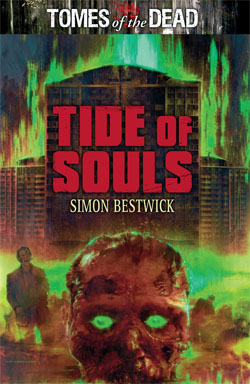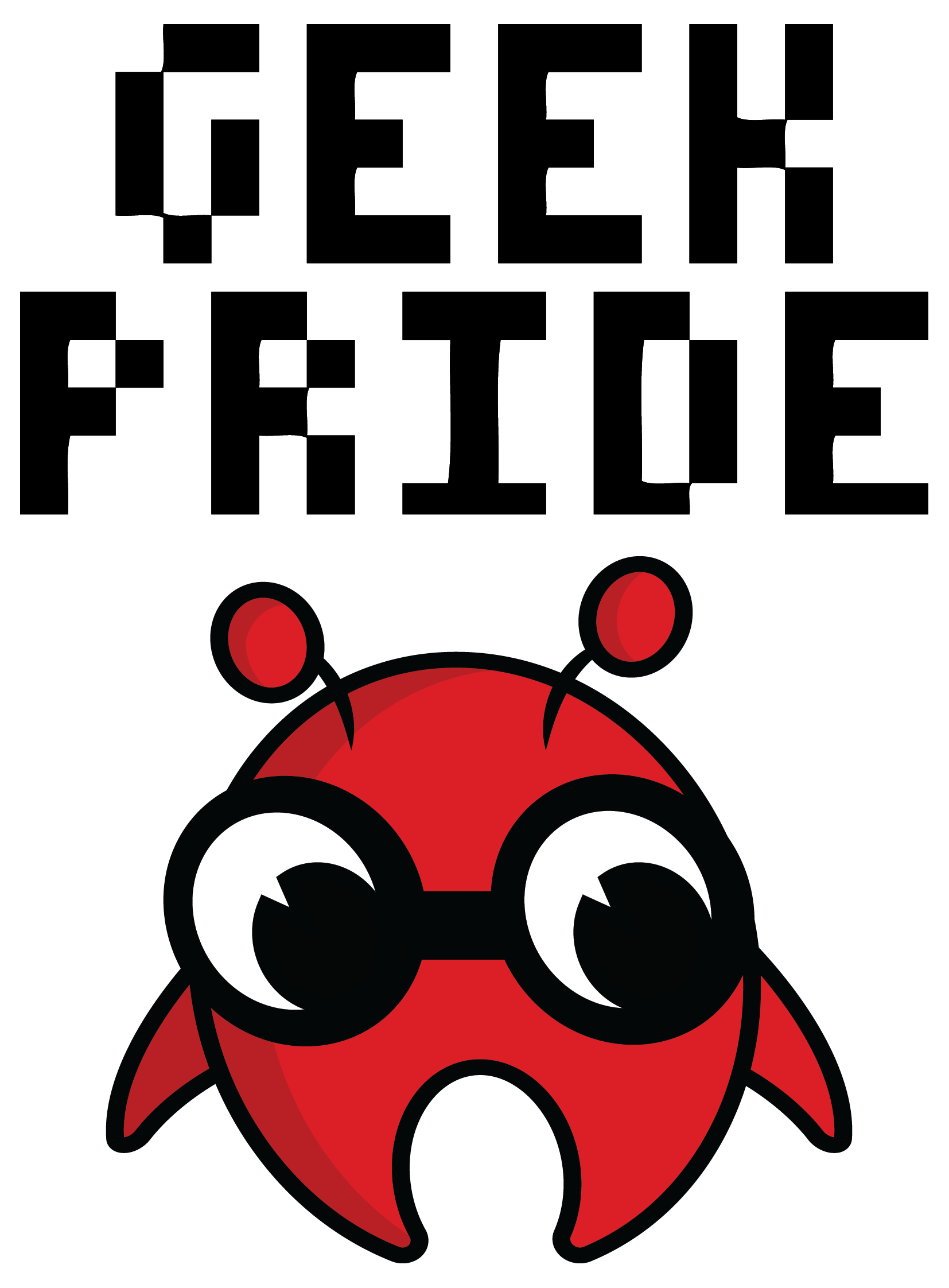Simon Bestwick is a modern horror author residing in the North of England. Hailed as one of “the most important writers of contemporary British horror” by Ramsey Campbell, his works include; Tide of Souls, The Faceless, A Hazy Shade Of Winter, Pictures Of The Dark, Let’s Drink To The Dead, Angels of the Silences, short stories, and more recently, the Condemned and Thin Men with Yellow Faces. He also writes for Thisishorror and radio.
It would be fair to say his work is imaginative, fun and unnerving, working that golden zone between pulp and genuine insight into multifaceted humane characters. His stories are usually set in my homeland – the North of England. His stories are like our cities; full of satanic mills and ancient shifting moors; packed with decay, death, life and ghastly histories.
Plus he’s a nice guy, with only a few hints of possession by non-human entities.
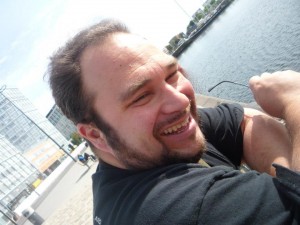
As a published horror author, could you tell us a bit about what draws you to horror as your preferred arena?
I loved that kind of thing as a boy – I was part of the generation that was terrified by the monsters in Tom Baker-era Doctor Who, and I read anything remotely horror-ish, from children’s books to more grown-up stuff. I devoured reams of the pulpy, shlocky horror novels that you got in the 70s and 80s, but I was also lucky enough to encounter writers like Edgar Allan Poe, Algernon Blackwood, and Ambrose Bierce at an early age, not to mention Ray Bradbury, Richard Matheson and Robert Bloch. In my late teens and early twenties I went through a very precious ‘literary’ phase where I threw out all my genre stuff, but later on I realised that it was the kind of fiction that suited me down to the bones – at least if you have a broad definition of the genre, which I do. To me, Kafka’s The Trial or Metamorphosis are horror, as are films like Threads or Eraserhead. And the great Greek tragedies – Oedipus Rex, Antigone, The Bacchae – come under that definition to me as well.
As a writer, I find that horror gives me a lot of freedom – I can rope in elements of crime, science fiction, fantasy or anything else I please at will. I think each genre gives you a different set of tools, so when you can pick and choose in that way, you can do a lot more,
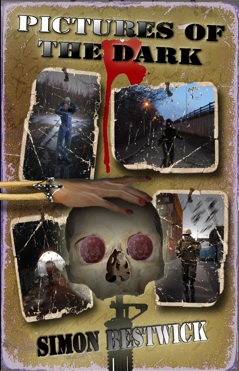
What’s the story of your first work being published?
I graduated from college in 1996 and went straight into a dead-end office job. Up until then, I’d always said I was a writer, but was writing very little – just as and when the muse struck, which wasn’t that often. Once I was working, though, I felt I had to write in earnest now, if I actually wanted to call myself a writer. The last half of 1996 was a pretty miserable time – nothing I tried seemed to gel. And then I rediscovered horror, first of all through through Nicholas Royle’s brilliant Darklands anthologies (which I highly recommend to anyone who’s not read them – they’re an excellent showcase of what good, intelligent horror fiction can be.) That didn’t change things overnight, but it pointed me in the right direction. Finally, on Boxing Day 1996, I wrote my first real short story – ‘Once’, which appears in my collection Pictures of the Dark. After that, I wrote a short story every week.
Meanwhile, I’d written to a couple of the authors from the Darklands anthologies for advice on getting into print. One of them, Simon Clark,made me aware of the small press magazines which at that time were very widespread in Britain. And as luck would have it, there was a new one called Unreal Dreams whose editor was based in Wythenshawe, very near to where I was living at the time. I sent him my first four short stories, and he accepted three of them within the week.
What do you face in real life that never fails to give you the creeps? We both live in Salford, so I’m wondering if a healthy fear of chavs is in there…
Depends what you mean by chavs, of course – but if you mean vicious, wilfully pig-ignorant, abusive violent scum I’m with you there. Though what I fear is often also what I hate and rage at – e.g. the Conservative Party. I’m fairly certain that most of us would struggle to concoct a monster as evil, cruel and callous as Iain Duncan Smith.
As a fiction writer (and if I’m not out of line for mentioning it, atheist liberal), do you think your ideology to some extent creeps into your work? Do you feel that there’s any controversial “messages” to any of your works?
Yes and no. That is, I try not to shoe-horn messages or polemics into what I write, but if the way I see the world didn’t inform or shape the fictional worlds of my stories in some way then I think there’d be something very wrong! My values are humanistic and, broadly speaking, socialist; I think the biggest change that’s happened over the years is trying to paint the world less in terms of goodies and baddies and in slightly more nuanced terms. There are people in my stories and novels who are unutterable bastards, of course, but they’re still human and in many cases will believe they’re doing the right thing. Which is partly why the ghost of Gideon Dace appears to one of the characters in The Faceless to guide them around Ash Fell – I wanted him to put his side of the story across, even though the things he’s done are unconscionable. Although, that said, my work does have its share of human monsters – because, sadly, they exist.
![Proof that [Bestwick] is one of the best writers- of any genre- currently plying their trade...a perfect combination of style and substance. The book is beautifully written, yes. It has a great plot, yes. Most importantly though, it's scary as hell.' -Dark Musings.](https://www.geek-pride.co.uk/wp-content/uploads/2013/10/The-Faceless-1.jpg)
Related to the last question, is there anything you really do not want to write about and why? E.g. a sympathetic paedophile or rapist that the narrative makes you root for and would get away with their crimes?
I’m not sure I could pull that one off, although now that feels like a challenge! I think it’s possible to evoke sympathy for a character no matter what they’ve done, because – as I said above – they’re still human, but unless there’s something badly wrong with you you’d sympathise with the rapist or paedophile in spite of, not because of, their actions. And first and foremost, your sympathy should be with the victims of such assaults. Horror, though, is the genre most concerned with making monstrous figures sympathetic. At the moment, I can’t imagine any subject matter being off limits in and of itself.
Do you subscribe to the notepad method for little ideas, or are you more a Stephen King sort who leaves ideas to percolate so good ones will stick around?
A little of both, to be honest. I always try to have a notepad with me, but there are times when I hardly use it and just sit around mulling silently. I do tend to use it a lot when I’m working on something, especially a longer piece, because ideas will usually start coming thick and fast once I’m underway – like a pebble starting off an avalanche.
Describe to us your creative process – do you start with a character, a question, a monster, a setting, a feel? What moulds your creative vision in the early stages of coming up with a new novel or short story? What’s your opinion on the most effective out of first person, third person, present or past tense?
It can start off with any of those things. Sometimes an idea for a character or a setting will float around waiting for a story to include it. But there’ll be something, and eventually I’ll make some tentative notes. As I said above, the very act of writing often brings up some new ideas, so I’ll get them down too. At first, it’s a person instinctive process, basically feeling my way. Eventually, something starts to take shape. I usually outline before writing anything – even short stories – these days. I try to think about what I’m working on in terms of scenes, like a film script or a play. Once I’ve got that, I’m good to go. After that, I have a very workmanlike approach, which is to write 2500 words a day until it’s finished. Now and again I’ll have to stop and backtrack – if the words aren’t coming easily, it’s usually because I’ve taken a wrong turn somewhere, so it’s a matter of finding that point and fixing it – and I’ll make notes about stuff that needs changing or developing in the rewrite. The subsequent drafts involve trimming the word-count and fixing the various problems. If possible, I’ll read through the work aloud with pen in hand – that’s a very good wayof catching what works or doesn’t.
As for the tense and which person you use – there is no right answer. It depends entirely on the individual story and what it needs in order to work. All rules are ultimately ad hoc and provisional, other than the following: a) Write a set amount every day until you’ve finished; b) find out what’s wrong with the piece; and c) fix it.

Related to the above, do you think it’s easier or harder to write a horror story from an omniscient narrator POV and keep it scary?
Harder, I suspect. Subjectivity is a very powerful factor in the best horror fiction. Not least because so much of it revolves around the idea that we don’t know as much as we think. Encountering something that’s so far outside what we know, the first impulse is to rationalise it, fit it into the view of the world we already have. The shock of recognising that reality doesn’t make sense in the terms of reference you’ve lived by is recurring in so much horror, from Machen to Lovecraft – it’s there in a number of M.R. James’ stories too, most notably ‘Oh Whistle And I’ll Come To You, My Lad.’ And of course if you want to build suspense it’s much easier to do that
When it comes to “keep writing” clichés, do you think “write what you know” or “write what you want to read” resonate more, emotionally?
The second one, definitely. As with acting, you’ll ultimately mine your own experiences, memories and emotions for material as you work anyway. If I confined myself to writing what I know, I’d never be able to tell the stories I want to tell.
What’s your favourite work of your own to date?
That’s a really difficult one – I’m rubbish at picking favourites. And to be honest, I always think my best work is the one I haven’t done yet. Out of my published novels, I’d probably say The Faceless; I worked long and hard over that, and I hope I got it almost completely right. When it comes to short stories it’s much more of a struggle, but two recent stories that I’m very proud of and think stand among my best stuff are ‘Lex Draconis’, which is something a bit different for me, a sort of fantasy tale written for an anthology called Tales of the Nun and Dragon, and ‘The Children of Moloch’, which was written for the Gray Frair Press anthology Death Rattles and is quite definitely horror!
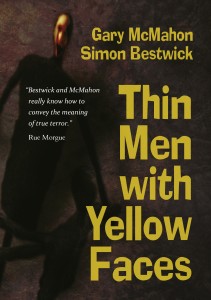
What do you have in the pipeline?
I’ve completed two new novels since The Faceless, both quite different from what I’ve done before- Hell’s Ditch, which is a mix of post-nuclear dystopian SF, thriller and Lovecraftian horror, and Riders on the Storm, which is more SF/Fantasy, with a bit of historical fiction thrown into the mix. It has airships in it too, but I don’t think it’s steampunk. There’s also a horror novel called The Song Of The Sibyl – which reads like a modern-day version of The Seventh Seal, transposed to Northern England and directed by David Lynch – at draft stage, a half-finished crime novel called Reaper, and plans for a new horror novel. Now all I need is a publisher…
Which of your novels would you least like to wake up in and why?
Tide of Souls, because the world of that story is the most fucked and hopeless of the lot.


